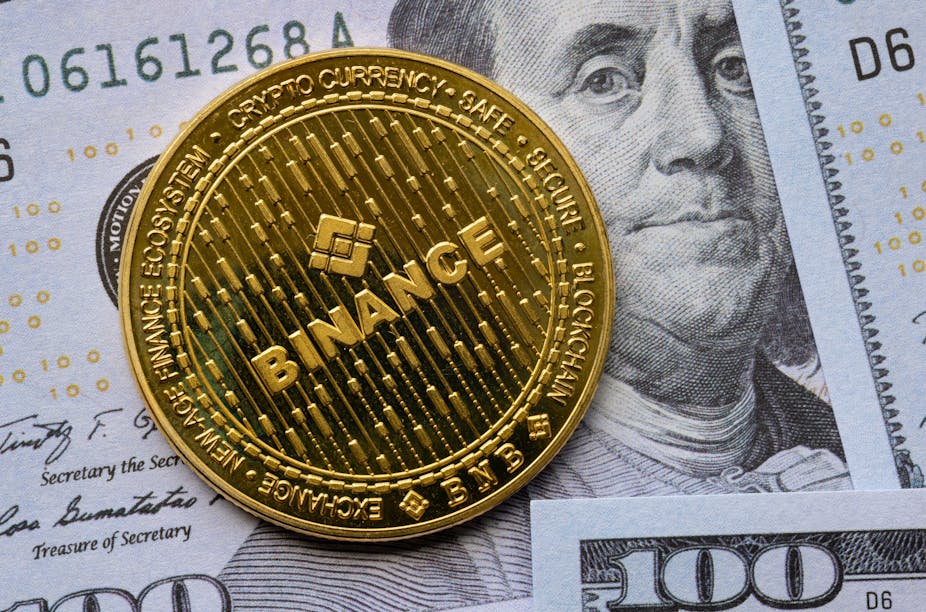The US Securities and Exchange Commission (SEC) sued the cryptocurrency platform Coinbase shortly after launching a lawsuit against the world’s largest cryptocurrency exchange, Binance.
This isn’t the first time Binance and Coinbase have caught the SEC’s attention – it’s not even the first time this year. But the latest charges are much more serious, including accusations that the exchanges are operating without the correct registration.
Both cases boil down to whether or not cryptocurrency tokens should be classed as “securities”, like stocks, and regulated in the same way. Binance and Coinbase have spoken out in support of regulation. And many crypto firms believe that by taking legal action instead of creating clear rules, the SEC has failed to provide the industry with enough guidance, leading to uncertainty for people and businesses.
Since Gary Gensler became chair of the SEC in April 2021, he has regularly testified before Senate committees on the need for more staff to regulate cryptocurrencies, calling the market a “wild west”. On the other hand, he has also said he has no plans to ban cryptocurrencies, while the SEC approved the first Bitcoin ETF in 2021, as well as Coinbase’s stock exchange listing that same year.
But now the SEC has filed 13 charges against Binance and its founder Changpeng Zhao, as well as a motion to freeze assets belonging to Binance’s US affiliate (Binance is based in the Cayman Islands). The SEC has also accused both Binance and Coinbase of operating unregistered exchanges, and offering the sale of unregistered securities in the form of crypto tokens.
Binance has pledged to vigorously defend itself against the lawsuit, which it said reflected the SEC’s “misguided and conscious refusal” to provide guidance and clarity on regulation to the cryptocurrency industry.
Coinbase’s chief legal officer said in a statement to CNBC about the charges that “the SEC’s reliance on an enforcement-only approach in the absence of clear rules for the digital asset industry is hurting America’s economic competitiveness and companies like Coinbase that have a demonstrated commitment to compliance”.
He called for legislation that “allows fair rules for the road to be developed transparently and applied equally, not litigation”.
Counting the costs
These cases are similar to another brought against a crypto company called Ripple Labs by the SEC in December 2020. It argues that XRP, Ripple’s cryptocurrency token, is an unregistered security. Ripple disputes this and expects to spend US$200 million (£156 million) fighting the suit, according to its CEO. He argues such cases are preventing US innovation around the blockchain technology that powers crypto trading.
At the heart of this case is the question of whether Ripple’s token satisfies the Howey test, which would deem it a security, just like a stock or a bond, for regulation purposes. The test sets out three key criteria for deciding whether a financial product should come under securities regulations:
- it is a financial investment, meaning that participants in the transaction must be risking their own money
- it is a shared enterprise, so the financial success of investors should be somehow connected
- there is an expectation of profits solely from the effort of others.
According to the SEC, the first criterion is easily satisfied with crypto because fiat money or other digital assets are being exchanged. Likewise, the “common enterprise” test is also easily met when trading cryptocurrencies. The third criterion largely turns on whether digital assets come with an “expectation of profit to be derived from the efforts of others”.
Why does this matter?
The most recent SEC lawsuits against Binance and Coinbase go after the lifeblood of the cryptocurrency industry: the exchanges or platforms on which people trade, as opposed to the individual digital assets or tokens. These platforms enable investors to buy and sell cryptocurrencies easily without the need for expert knowledge of how blockchains work.
The lawsuits have had an immediate and significant impact on crypto values. Coinbase customers pulled about US$1.28 billion from the exchange after the news broke, according to initial estimates from data firm Nansen. Coinbase’s parent company, Coinbase Global Inc (COIN.O), saw its shares close down US$7.10, or 12.1%, at US$51.61, after falling as much as 20.9% earlier on the day the charges were announced.
In the meantime, customers withdrew around US$780 million from Binance and its US affiliate in the 24 hours following the lawsuit, according to Nansen. The Bitcoin market has rallied since, although Binance.US has stopped trading in a number of its cryptocurrencies.
These latest lawsuits look like US regulators are drawing a line in the sand. If successful, these cases will limit US investors’ access to assets on these platforms and will also create further market uncertainty for companies and people.

Global coordination on crypto rules
Research shows around 17% of people in the US have traded, invested in or used a cryptocurrency. If the crackdown by regulators cuts their access, these people may be able to use centralised exchanges in other countries, decentralised exchanges, or other means to trade cryptocurrencies.
But regulators in other major financial markets could follow the SEC’s lead when it comes to crypto rules. The UK’s Financial Conduct Authority recently announced new regulations for cryptocurrency firms operating in the country. This includes measures to ensure investors know the risks involved, that adverts are clear and not misleading, as well as a ban on “refer a friend” bonuses. But these rules will only affect the marketing of cryptocurrencies in the UK, so it’s a relatively small step.
Cryptocurrency providers seem to want regulation to provide legitimacy and clear parameters in which to work. Given the borderless nature of cryptocurrencies, regulators need to align internationally or exchanges will simply move to “friendlier” jurisdictions. Global leadership is needed to establish how – and if – cryptocurrencies should be regulated. Without this, regulators like the SEC will struggle to corral the growing global crypto market.

